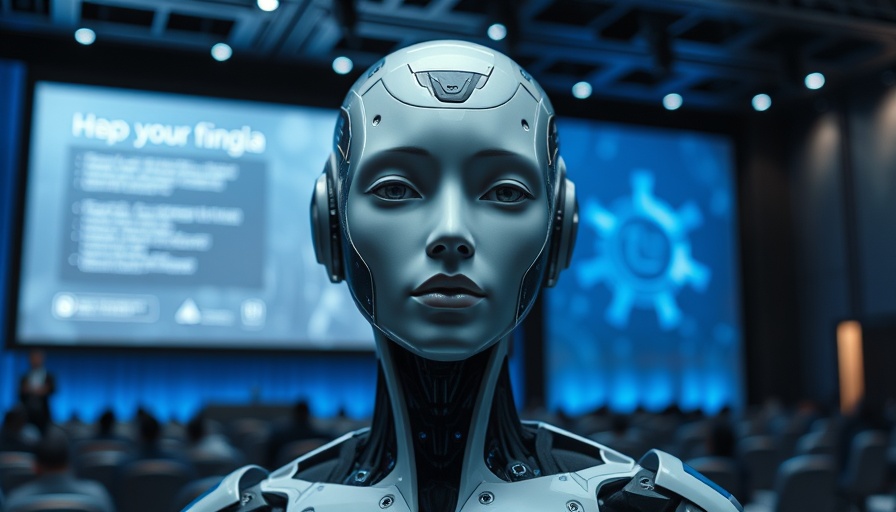
The Unseen Revolution: How AI Shapes Our Future
In a thought-provoking talk at the University of Toronto, Isa Sudskver, co-founder and former chief scientist of OpenAI, delivered a stark warning to students: while you may not take interest in politics, politics will take interest in you—an analogy that resonates loudly in the realm of artificial intelligence (AI). His message outlined a critical truth: AI is already molding our world in ways we may not fully grasp. For leaders, R&D directors, and innovation executives, this isn’t just a futurist's fantasy; it's a present-day reality.
In 'Prepare Yourself!' Warning from an OpenAI Ex Scientist, the discussion dives into the transformative impact of AI, exploring key insights that sparked deeper analysis on our end.
AI's Current Impact: A Snapshot
The rapidly accelerating integration of AI into various sectors exemplifies Sudskver's assertion. For instance, in South Korea, AI-powered tutors are reshaping education by analyzing individual learning styles and adapting in real-time. Meanwhile, in India, the government has launched an AI portal to assist farmers with crop planning and resource management, significantly impacting agricultural productivity. Here in the United States, companies like CLA have cut support staff by more than 75% as AI chatbots handle the bulk of customer service interactions. These developments highlight how AI isn't merely assisting us; it's redefining how we operate in many facets of life.
AI and the Future of Work: Predictions You Can't Ignore
As we look toward the future, industry experts warn of a dramatic shift in employment landscapes. Eric Schmidt, former CEO of Google, prophesized that within a year, the majority of programmers could be replaced by AI systems. This does not imply complete job loss but a transformation of roles, as AI becomes more capable of tasks traditionally reserved for humans. Advanced AI models, such as OpenAI’s GPT-4, have already begun outperforming thousands of law students by passing the uniform bar exam in the 90th percentile, raising critical questions about job security and ethical implications for professionals across various fields.
The Rise of Artificial General Intelligence (AGI)
The quest for AGI—the ability of an AI to reason, adapt, and solve complex problems independently—is gaining traction. With predictions that AGI could emerge in the next 3 to 5 years, the conversation has shifted from "if" to "when." Innovations like Google's Gemini models, which exhibit deep reasoning capabilities, signal that we are edging closer to achieving AGI. This represents not just the potential for machines to exceed human reasoning capabilities, but a radical transformation in how industries may leverage AI to drive efficiencies, streamline operations, and reduce costs.
Operational Efficiency: AI in Action
Across sectors, AI is already streamlining processes, eliminating layers of traditional work. For instance, JP Morgan's Coin platform now reviews legal contracts in seconds, vastly reducing operational hours and errors. In government contexts, Estonia has implemented AI to help assess small claims contracts, proving that AI is not just during potential workforce disruption but acting as an augmentation of existing processes right now. These changes reflect a greater trend where AI replaces conventional systems rather than whole jobs, prompting organizations to rethink their operational frameworks.
The Ethical and Regulatory Dilemma
However, the rapid shift towards AI deployment raises substantial ethical concerns, particularly regarding oversight and regulatory frameworks. The call for regulation has intensified, with over a thousand AI researchers recently signing a letter urging caution amid the proliferation of powerful AI models. As the European Union works on the AI Act and various Senate hearings discuss AI implications, it’s crucial for decision-makers to consider the broader societal impact of these technologies and the speed at which we're adopting them.
Your Role in the Evolving Landscape of AI
As we stand on the precipice of this AI-driven future, it’s essential for R&D directors, tech investors, and innovation executives to stay ahead of the curve. Understanding current AI capabilities and trends is vital not just for individual success but for strategic organizational planning. By preparing now, stakeholders can position themselves to capitalize on opportunities and navigate potential challenges effectively.
In an age where AI isn't just an operational tool but a colossal force within our processes, the time to engage with these advancements is now. Embrace the change, harness the insights, and lead your organization toward a future shaped by innovation.
 Add Row
Add Row  Add
Add 




Write A Comment